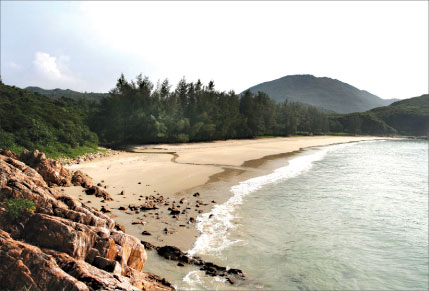Eco-tourism is not a marketing gimmick just to grab the attention of the public, but a set of benchmarks to gauge the quality of tours in terms of their environmental and social performances.
 |
| Pak Lap in Sai Kung |
More and more people are delving into the business of setting up Global Advice Houses to assist the travel industry in selecting the most suitable products and services to provide in order to help the organization achieve sustainability objectives.
Such consultancy usually requires a team of project managers providing management tools and expertise to effectively monitor and support environmental sustainability objectives.
Being eco-friendly and culture-friendly is the trendy lifestyle. For that reason, people are now more willing than ever to pay for a stay at brand name resorts.
An eco-resort should be appropriate in terms of its size, location, nature, scale of activities and services. And it should always have a focus on nature while the resort management must comply with relevant environmental legislation, regulations in regards to staff training, and contribute to the local community.
Eco-tourism is not only a relaxing activity, it also provides education opportunities for visitors to learn about the natural and cultural heritages of an area under the guidance of eco-guides who conduct their businesses in accordance with a code of practice and understand their duties to minimize adverse impacts to the environment.
Prior to the design and construction of a new eco-tourism facility, an environmental assessment will be undertaken. Architectural and landscape plans shall ensure that eco-tourism facilities and infrastructure are compatible with the physical and cultural landscape. Even building materials have to be sourced locally. Development should not be destructive, therefore an environmental management plan should cover areas that include waste minimization, energy efficiency, water conservation, treatment of waste water, biodiversity conservation, air quality, lighting and noise.
Water use is very important particularly in places where water is drawn from natural sources. The resort must not pollute the water, which is also used by local communities and ecosystems. Moreover, a proper approach with minimal impact on the wildlife should be adopted, such as the "natural quiet policy".
The habits of eating wild animals, for instance, shark fin, and the sale of coral reefs have raised a lot of arguments. We need to educate ourselves about the importance of biodiversity relating to the food chain in our ecosystem. Therefore, an eco-resort should be able to teach tourists about the impact of the sale of rare or threatened species and the value of cultural or heritage conservation by promoting their own eco-labeled products and advisory information.
Many resorts upholds the policy of employing local staff, serving local food, selling locally-made souvenirs and handicrafts. Such policy is important and is beneficial to the local community.
The marketing principle of most tourism products is "boosting" and sometimes "over-selling". Marketing materials for eco-tourism products should always provide accurate and updated information such as the environmental significance of the natural attributes of the area. It should also provide customers with realistic expectations of what they will encounter and what to watch out for.
Last but not least, the endorsement from the owners of protected areas in the region, government conservation agencies and NGOs (non-governmental organizations) is vital to the recognition of any eco-tourism products.
The author is the marketing development director of HK Discovery.
(China Daily HK Edition September 12, 2008)